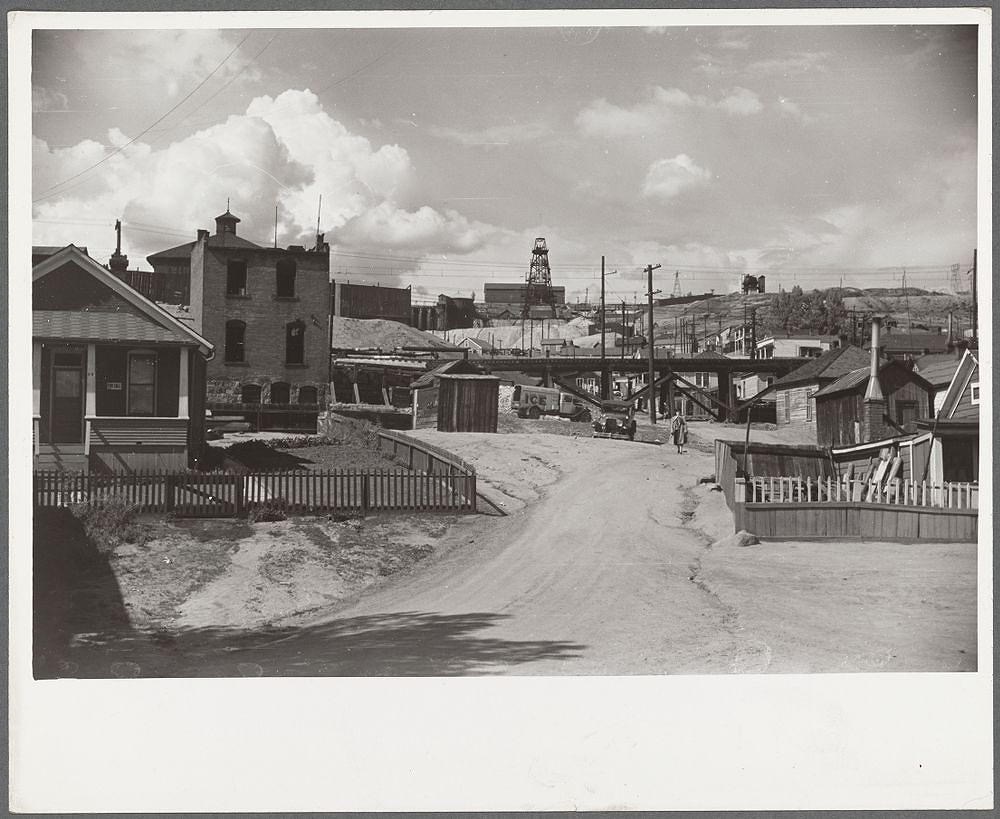HistoryLesson

Arthur Rothstein: Street in Butte, Montana (1939)
Farm Security Administration Photographs
The Miriam and Ira D. Wallach Division of Art, Prints and Photographs: Photography Collection, The New York Public Library. "Street in Butte, Montana" The New York Public Library Digital Collections. https://digitalcollections.nypl.org/items/32c50bd0-059b-0138-0ab0-4f25bfb71a96
—
"…he very best portrait of our American Dream, and one hell of a HistoryLesson."
The history of the American West comes deeply steeped in myth, though even deeper truths become apparent with any visit. This remains a rough and relatively wild place, with poverty its most obvious characteristic. Small towns tend toward something other than the idyllic. The few cities seem displaced and still largely experimental. The highways connecting places seem mostly empty and in need of considerable repair. The scenery remains breath-taking, even daunting. Those who live there still struggle to survive, let alone thrive, for the economy remains securely stuck in some prior century the inhabitants seem quick to defend. HistoryLessons seem perhaps more apparent to visitors than to residents, who have been the serial victims of many previous attempts to prosper.
Relatively desperate people settled the American West, people fleeing almost certain ruin on the prospect that they might get lucky, or luckier than their birthright alone proved. Second sons and unlanded immigrants came seeking what became known as the American Dream. There's no more powerful motivator than an unrequited dream. While it remains unfulfilled, it fills the dreamer with potential, possibilities perhaps not yet realized but still seemingly achingly possible. People came West to better themselves. Upon arriving, they often found people worse than they'd ever known ready and willing to take advantage of their vulnerabilities. They swindled and persuaded, enticed and provided opportunities for them to undermine their dreams. Many succeeded in securing some donation land claim only to later learn that the rain doesn't actually follow the plow, and no matter how hard anyone might try to succeed, it took more than will and seed to run a successful farm.
The pattern became clearer over time. Initial desperation, or the apparent threat of it, would drive people to take a chance and relocate to places not then domesticated. An ennobling optimism would motivate them to attempt to tame that land. For each successful settler, several would fail. Some would limp back to what so-called civilization might promise, but perhaps more would settle for something less than they'd originally envisioned, becoming a miner, logger, or laborer rather than an owner and master of a domain they possessed. They joined the dispossessed. They became renters. They lived in distressed circumstances, perhaps worse than they ever would have faced back home, but they'd come too far to consider simply returning to what could no longer pass as home for them once they'd been inspired to chase their dream.
The towns, built during periods of wild enthusiasm, tended to be overbuilt. In Lewistown, Montana, for instance, beautiful terra-cotta-fronted buildings sit largely empty and unused after a succession of panics and droughts left the surrounding area struggling through successive generations. Today, the local chamber of commerce imagines that they might attract festivals and visitors who might come to vicariously experience small-town life. The small town, while beautifully situated in a well-watered valley, looks blighted, with housing stock far out-dated and badly worn, and little local industry to keep the offspring home. No college to renew local skills. Little future but more skids.
Small-town life has always been challenging. Unlike the bucolic depictions presented by homesick content providers, small towns struggle to provide what city dwellers accept as their god-given right. A clear pattern of optimism followed by despair hangs everywhere: in the lovely downtowns filled with beautiful, empty buildings, in neighborhoods featuring tumbledown houses and abandoned automobile lawns, in non-union jobs that age anyone quickly, and in opportunities that stopped knocking generations ago. Our small towns are increasingly filled with older people who find an economy their limited income appreciates without really needing it to provide prosperity they found after they'd earlier relocated to a bigger city.
Our futures rely upon a certain amount of unbridled optimism. So do our pasts. Nostalgia motivates every bit as well as does a dreamer's imagination. The American Dream seems ultimately delusional, yet it remains well worth pursuing. The likelihood of succeeding seems exceedingly slim, especially when considered against the backdrop of actual experience. Still, any time lived in enthusiastic thrall seems more than worth the investment, even if it brings perhaps an inevitable fall. We crumble then settle, often mining satisfaction from hard rock luck. The future and the past utterly depend upon our continuing optimism. The certainty of ultimate failure need not significantly color the quality of anyone's present experience. Those nearly derelict small towns steeped in their own questionable histories might just be the very best portrait of our American Dream, and one hell of a HistoryLesson.
©2025 by David A. Schmaltz - all rights reserved


